| Srl | Item |
| 1 |
ID:
146271
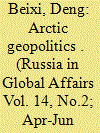

|
|
|
|
|
| Summary/Abstract |
In the post-Cold War era the countries bordering the Arctic have not secured a framework security treaty for operations in that extreme northern region. While attempting not to miss the considerable potential economic advantages, the Arctic nations have been careful to maintain a well-functioning cooperation mechanism and ensure favorable conditions for developing and investing in the region. However, the existing mechanism has failed to prevent negative global trends from affecting the region. The sanctions imposed by the United States and the European Union on investment and the transfer of technologies to Russian oil and gas companies engaged in mineral prospecting and extraction have created a spirit of rivalry in the Arctic between the East and the West.
|
|
|
|
|
|
|
|
|
|
|
|
|
|
|
|
| 2 |
ID:
145228


|
|
|
|
|
| Summary/Abstract |
Did the United States promise the Soviet Union during the 1990 negotiations on German reunification that NATO would not expand into Eastern Europe? Since the end of the Cold War, an array of Soviet/Russian policymakers have charged that NATO expansion violates a U.S. pledge advanced in 1990; in contrast, Western scholars and political leaders dispute that the United States made any such commitment. Recently declassified U.S. government documents provide evidence supporting the Soviet/Russian position. Although no non-expansion pledge was ever codified, U.S. policymakers presented their Soviet counterparts with implicit and informal assurances in 1990 strongly suggesting that NATO would not expand in post–Cold War Europe if the Soviet Union consented to German reunification. The documents also show, however, that the United States used the reunification negotiations to exploit Soviet weaknesses by depicting a mutually acceptable post–Cold War security environment, while actually seeking a system dominated by the United States and opening the door to NATO's eastward expansion. The results of this analysis carry implications for international relations theory, diplomatic history, and current U.S.-Russian relations.
|
|
|
|
|
|
|
|
|
|
|
|
|
|
|
|
| 3 |
ID:
186385
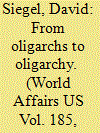

|
|
|
|
|
| Summary/Abstract |
Drawing heavily on theories about Russia's informal politics, American sanctions were designed to change Russian foreign policy by exploiting political conflict among oligarchs and the state elite; however, after nearly eight years of sanctions, Russian elites seem more united than ever. I propose that Russia's oligarchs—the ruthless self-interested economic elite in Russia's informal political system—might sometimes act as a cohesive oligarchy, particularly when their wealth is threatened from external rather than domestic sources, as has been the case under Western sanctions. Through an in-depth case study on the design and outcome of sanctions, this article seeks to develop a more dynamic theory of Russia's informal politics and explain the apparent cohesion among state and economic elites since 2014 as the result of a politics of wealth defense induced by Western sanctions.
|
|
|
|
|
|
|
|
|
|
|
|
|
|
|
|
| 4 |
ID:
153478
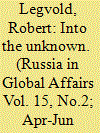

|
|
|
|
|
| Summary/Abstract |
Russian and U.S. leaders, as they contemplate what next in the wake of the U.S. presidential election, are not only making their choices as the ground under them churns, the choices they make, whether they realize it or not, will bear directly on how dystopian the coming global order will be. The context for contemplating the possible direction U.S.-Russian relations may take is clouded not only by the tumult in the world outside, but by the political watershed the United States is now entering. Like the transformation recasting the international setting, the denouement of this passage will not come soon.
|
|
|
|
|
|
|
|
|
|
|
|
|
|
|
|
| 5 |
ID:
150321
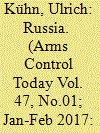

|
|
|
|
|
| Summary/Abstract |
The incoming Trump administration inherits a U.S.-Russian relationship marked by disagreement and confrontation in the wake of Russia’s annexation of Crimea, the wars in Syria and Ukraine, the West’s use of economic sanctions, and reciprocal complaints about interferences in domestic affairs.
|
|
|
|
|
|
|
|
|
|
|
|
|
|
|
|
| 6 |
ID:
143134
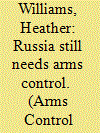

|
|
|
|
|
| Summary/Abstract |
These are dark days for strategic arms control. Events in Ukraine have brought U.S.-Russian relations to a post-Cold War low point, and Russia increasingly relies on its nuclear arsenal for signaling and prestige. Yet, if Russia hopes to achieve its aim of being a great power or at least being perceived and treated as one, arms control is a status symbol and cost savings mechanism that it cannot afford to waste.
|
|
|
|
|
|
|
|
|
|
|
|
|
|
|
|